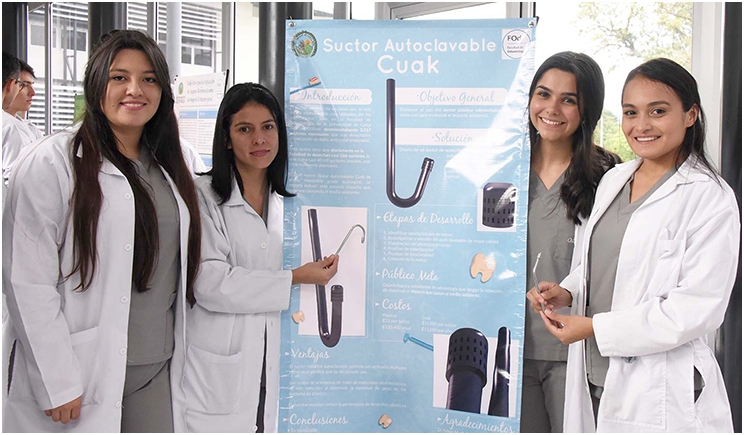
Dentists need to throw away dental saliva ejectors after just one use as part of their infection control protocols, adding more plastic waste to the environment. Four dental students at the University of Costa Rica (UCR), however, have developed a metallic saliva ejector that can be cleaned in the autoclave and reused again and again.
For example, the UCR Faculty of Dentistry throws away 166 ejectors each day, 3,317 each week, and almost 4,000 each year. The students also note that if each of Costa Rica’s 232 dental offices sees 12 patients a day, they would throw away about 801,792 ejectors—which cost about ₡520,400—each year. Metal ejectors would eliminate this waste and save these costs.
“Plastic saliva ejectors are one of the instruments used by dentists that generate a big impact at the environmental level. So we proposed a stainless steel, autoclavable, surgical grade ejector to reduce this impact through a design that meets all of the conditions for professionals who decide to change from the usual plastic ejector,” said Yulieth Segura Castillo, one of the students.
The students began their research and development process with several prototypes made out of various metals, though some could not stand the heat, were deformed, or failed during use. Next, they worked with a metallurgist to develop a final prototype that successfully passed all sterilization and functionality tests.
The nozzle on the metal ejector can be removed, which improves autoclaving, the students report. And while the metal ejector costs ₡11,000 compared to the ₡13 cost of a plastic ejector, the students call the metal ejector a long-term investment that saves dentists both the costs of buying thousands of plastic ejectors as well as the costs of disposing them, since many waste companies that collect biological waste charge by weight.
Related Articles
Capsazepine Analogs Prove Effective Against Oral Cancer
Researchers Uncover Multiple Cell Types Involved in Tooth Development
Dental Students Provide Volunteer Care at Special Olympics











